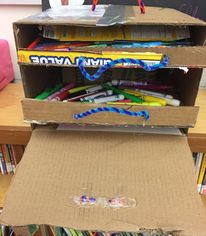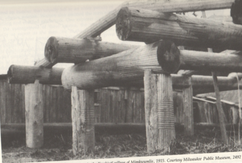Since the beginning of January, we have been busy learning and creating! Here are some of the things that we worked on at the beginning of the month and a sneak peek of what is coming:
Most Magnificient Thing Project
 This is an example of a sophisticated Crayon Box created by Jacob
This is an example of a sophisticated Crayon Box created by Jacob Last week, to follow-up on this project, students wrote "How to" instructions to explain how to build their invention. Students created a list of materials and step-by-step instructions using drawings and short sentences.
Science: Physics and Simple machines

We looked at the size of the trees and at drawings showing the size of the logs used for some big houses. Students were impressed to learn that all of this had been been without the use of the modern machinery that we now find in a construction site and made predictions regarding the simple machines that could have been used for various tasks.
The first couples weeks, we introduced the inclined plane, wedge, lever, pulley, wheel and gears. Students explored simple machines through stations set up in the class and recorded their observations and questions with words and drawings. Short videos of the exploration are on the students' eportfolios, in the scrapbook section.
Last week, we started to learn the concepts of gravity, force, mass, charge, work and energy and we studied the inclined plane. We played a "mystery word" game using the simple machines vocabulary during our morning meetings and we played some online educational games during snack time (see Resources for link if your child wants to play at home)
Mathematics
We will start to study multiplication this week, using visual models and real world problem- solving tasks. It is important that students spend a bit of time daily, at home, to develop their understanding and fluency with multiplication. Rote memorization of multiplication tables is not the ultimate goal: while we want students to know some multiplication facts, it is important that they understand multiplication enough to be able to use their number sense and mental math strategies to find the products. Please visit the Math Resources to download Multiplication flashcards that use visuals (subitizing and arrays) and to learn some ways in which you can use them to build Multiplicative fluency. Make up games using the cards: be creative and have fun learning math!
Social Studies and Reading Comprehension
Pre-reading strategies:
- looking at the title, subtitle and pictures
- making predictions about what we are going to read
- activating prior knowledge: what do we already know about this topic?
- Reading each paragraph and identifying the key words
- Using the Glossary (lexique) to find out the meaning of bold words
- Connecting the words with the pictures and subtitles
- Finding the main idea of each paragraph and stating it in our own words
- Taking notes
We will finish reading our chapter this week. Then, students will be divided into groups and each group will be given one chapter of the textbook to explore. Groups will be guided in using the reading strategies practiced in class in order to summarize the main ideas of their chapter. Students will represent their learning in an engaging way to communicate the information to the class (Communication Competency)
Physical and Health Education
Digital Citizenship and Social Media: Jesse Miller gave a terrific presentation on Social Media last Thursday. On Friday, students wrote reflections on Social Media in their journal. Please ask them questions about what they learned and what surprised them.
Skating: On February 13th and 20th, we are going skating at Kerry Park. I have enough parent volunteers! Thank you! Don't forget to return the permissions slips...
Drama week!
On Wednesday morning, Andrea Cross from Chemainus Theatre will visit our class to give students a drama workshop.
Have a great week!
Nathalie
 RSS Feed
RSS Feed
